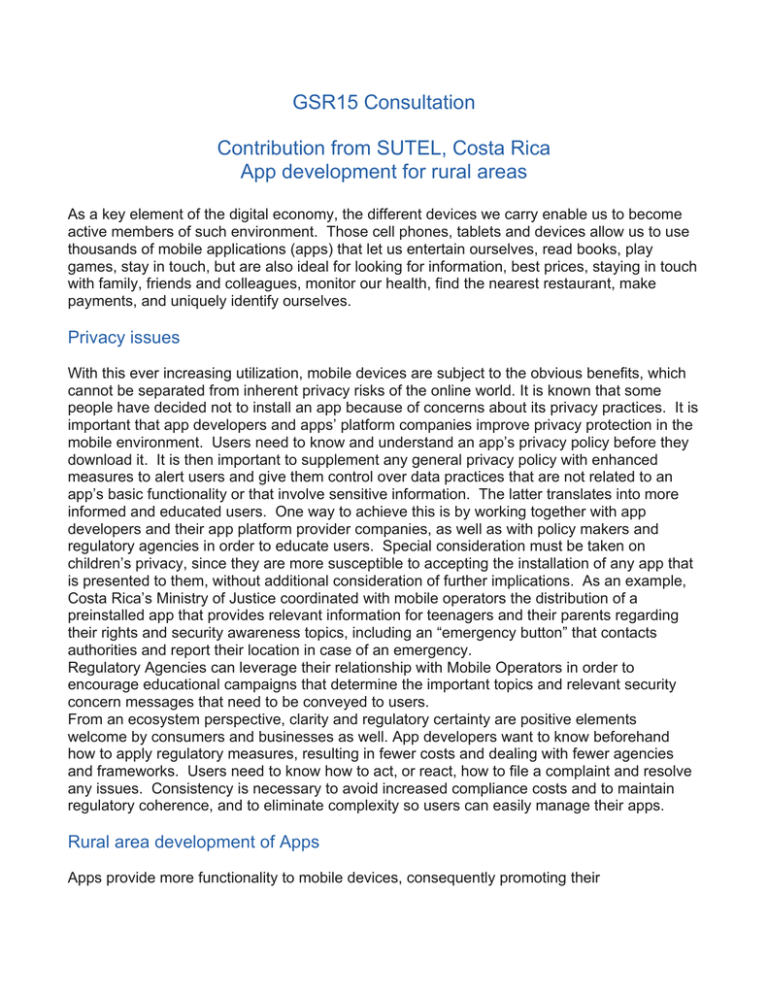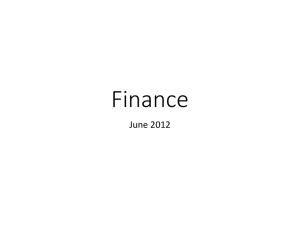GSR15 Consultation Contribution from SUTEL, Costa Rica App development for rural areas
advertisement

GSR15 Consultation Contribution from SUTEL, Costa Rica App development for rural areas As a key element of the digital economy, the different devices we carry enable us to become active members of such environment. Those cell phones, tablets and devices allow us to use thousands of mobile applications (apps) that let us entertain ourselves, read books, play games, stay in touch, but are also ideal for looking for information, best prices, staying in touch with family, friends and colleagues, monitor our health, find the nearest restaurant, make payments, and uniquely identify ourselves. Privacy issues With this ever increasing utilization, mobile devices are subject to the obvious benefits, which cannot be separated from inherent privacy risks of the online world. It is known that some people have decided not to install an app because of concerns about its privacy practices. It is important that app developers and apps’ platform companies improve privacy protection in the mobile environment. Users need to know and understand an app’s privacy policy before they download it. It is then important to supplement any general privacy policy with enhanced measures to alert users and give them control over data practices that are not related to an app’s basic functionality or that involve sensitive information. The latter translates into more informed and educated users. One way to achieve this is by working together with app developers and their app platform provider companies, as well as with policy makers and regulatory agencies in order to educate users. Special consideration must be taken on children’s privacy, since they are more susceptible to accepting the installation of any app that is presented to them, without additional consideration of further implications. As an example, Costa Rica’s Ministry of Justice coordinated with mobile operators the distribution of a preinstalled app that provides relevant information for teenagers and their parents regarding their rights and security awareness topics, including an “emergency button” that contacts authorities and report their location in case of an emergency. Regulatory Agencies can leverage their relationship with Mobile Operators in order to encourage educational campaigns that determine the important topics and relevant security concern messages that need to be conveyed to users. From an ecosystem perspective, clarity and regulatory certainty are positive elements welcome by consumers and businesses as well. App developers want to know beforehand how to apply regulatory measures, resulting in fewer costs and dealing with fewer agencies and frameworks. Users need to know how to act, or react, how to file a complaint and resolve any issues. Consistency is necessary to avoid increased compliance costs and to maintain regulatory coherence, and to eliminate complexity so users can easily manage their apps. Rural area development of Apps Apps provide more functionality to mobile devices, consequently promoting their utilization. Extended use of such devices correspondingly allows for more consumers to rapidly expand the apps market. Globally known apps will continue their expansion in all regions of the world, but since they tend to be written in other languages different from the one used by local citizens in certain areas or Countries, in order to extend their use in rural or remote areas of many nations, an additional effort needs to be done. Some initiatives include working with app developers in order to customize and/or translate the applications to adjust them to local requirements. Additionally, promoting local developers and helping them fund their projects can be analyzed as a way to increase local content creation, but most importantly, to direct developing efforts to cover local needs for a particular region or group of citizens. Costa Rica´s strategy to promote socioeconomic development in rural areas for example, considers exploiting the Country´s natural resources such National Parks or protected areas which are greatly appreciated by certain type of tourism that looks for pristine conditions away from urban development and active lifestyle. Those regions are located where operators are not interested in investing since is not profitable. Therefor, with funds from the Universal Access Fund (UAF), the regulatory agency is providing basic telecommunications services in those remote areas and launching a subsidized program to help people in need to afford the monthly fee and be able to purchase a device for accessing basic telecommunications services and the Internet. Joint efforts with other Government agencies have been signed to promote education, digital alphabetization and inclusion in health related programs. However specific or local apps to facilitate the adoption based on particular needs still require some planning. For example, rural communities or organized groups are demanding Internet access since visitors request it, but they have not realized the potential benefits some apps could offer, like communicating with current or potential clients, offering additional services to visitors like guided tours, zone information, translation services and more like them. These apps could be developed by some of the few local companies that are located in rural areas or under some guidance from consultants or socially responsible enterprises that can provide advice or knowledge transfer to high school students as part of their computer science classes so they can not only develop the apps but support them for added functionality or new services. In order to achieve this, public policies must be in place in coordination with Ministries of Science & Technology and of Education. Required additional money can be sought by public-private alliances or similar type of joint ventures. Infrastructure promotion in rural areas Additionally, rural areas tend to be have less infrastructure than needed to achieve desired connectivity goals, so UAF’ resources can be used to promote the installation of connectivity links (fiber optic, for instance) in order to either extend transport networks or add more capillarity to existing ones. By accepting to receive moneys to add access nodes from the Regulatory Agency UAF, an operator is compelled to share its infrastructure so any other operators can utilize the available resources. This could eliminate entry barriers and stimulate the offering of more and new services to these remote areas, lowering their prices and optimizing the utilization of scarce resources. As a final comment, a continuous open dialogue among Regulatory Agencies, ICT and Telco Sector Ministries and other public and private agents, as well as community representatives is important to understand the needs, the offerings and particular requirements that need to be addressed in order to facilitate the use of mobile applications to improve the life standard and socioeconomic development of the rural areas. It is important that beneficiary people be active in the specification, planning, development and support of the solution to their own needs. They need to adopt the solution that will benefit them.
